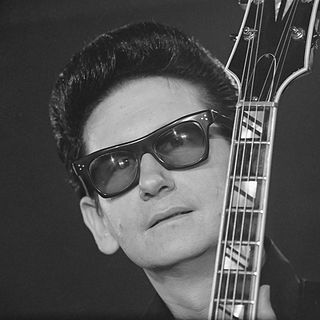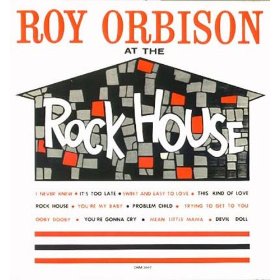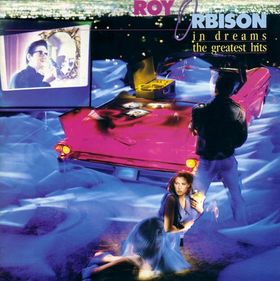Related Research Articles

Roy Kelton Orbison was an American singer, songwriter, and guitarist known for his distinctive and powerful voice, complex song structures, and dark, emotional ballads. Orbison's music is mostly in the rock genre and his most successful periods were in the early 1960s and the late 1980s. He was nicknamed "The Caruso of Rock" and "The Big O". Many of Orbison's songs conveyed vulnerability at a time when most male rock-and-roll performers projected machismo. He performed with minimal motion and in black clothes, matching his dyed black hair and dark sunglasses.
Joe Melson is an American singer and a BMI Award-winning songwriter best known for his collaborations with Roy Orbison, including "Only the Lonely" and "Crying", which are both in the Grammy Hall of Fame and have both been included in Rolling Stone's 500 Greatest Songs of All Time. Melson was inducted into the Nashville Songwriters Hall of Fame in 2018.
Roy Orbison and Friends: A Black and White Night is a 1988 Cinemax television special originally broadcast on January 3, 1988, presenting a performance by singer/songwriter Roy Orbison and the TCB Band with special guests including Bruce Springsteen, k.d. lang and others. The special was filmed entirely in black and white. After the broadcast, the concert was released on VHS and Laserdisc, and a live album was released in 1989.

Roy Orbison's Greatest Hits is a Roy Orbison record album from Monument Records recorded at the RCA Studio B in Nashville and released in 1962. Between the hit songs were also "Love Star" and "Evergreen" which were released here for the first time. "Dream Baby" had recently been a No. 4 hit in the United States and No. 2 in England.

Roy Orbison at the Rock House is the first album by Roy Orbison on the Sun Records label, released in 1961 at a time when Orbison had already moved to the Monument label. Sun Records owner Sam Phillips had a collection of songs Orbison had recorded at Sun during 1956–1958. Phillips capitalized on the national recognition Orbison had achieved at Monument through three major hit singles in 1960 and 1961 that had gone to the top of the Billboard charts.

There Is Only One Roy Orbison is the seventh album recorded by Roy Orbison, and his first for MGM Records, released in July 1965. It features his studio recording of "Claudette", an Orbison-penned song which had become a hit for The Everly Brothers in 1958. Ironically, at the time he recorded the song in 1965, he had divorced his wife Claudette, who had inspired the lyrics. Orbison later re-recorded the song for In Dreams: The Greatest Hits in 1985. The single taken from the album was "Ride Away", which reached no. 25 in the US charts, no. 12 in Australia and no. 34 in the UK. Cash Box described "Ride Away" as a "rhythmic teen-angled ode about a somewhat ego-oriented lad who cuts-out on romance."

In Dreams: The Greatest Hits is a two-record album set by Roy Orbison songs released in 1987 on Virgin Records. It was produced by Orbison and Mike Utley, except for the song "In Dreams", produced by Orbison with T-Bone Burnett and film director David Lynch. All songs are re-recordings by Orbison from 1986, except "In Dreams" from April 1987.

"Blue Bayou" is a song written by Roy Orbison and Joe Melson. It was originally sung and recorded by Orbison, who had an international hit with his version in 1963. It later became Linda Ronstadt's signature song, with which she scored a Top 5 hit with her cover in 1977. Many others have since recorded the song.

"Only the Lonely (Know the Way I Feel)" is a 1960 song written by Roy Orbison and Joe Melson. Orbison's recording of the song, produced by Fred Foster for Monument Records, was the first major hit for the singer. It was described by The New York Times as expressing "a clenched, driven urgency". Released as a 45 rpm single by Monument Records in May 1960, "Only the Lonely" went to No. 2 on the United States Billboard pop music charts on 25 July 1960 (blocked by Brenda Lee's "I'm Sorry") and No. 14 on the Billboard R&B charts. "Only the Lonely" reached number one in the United Kingdom, a position it achieved on 20 October 1960, staying there for two weeks (out of a total of 24 weeks spent on the UK singles chart from 28 July 1960). According to The Authorized Roy Orbison, "Only the Lonely" was the longest charting single of Orbison's career. Personnel on the original recording included Orbison's drummer Larry Parks, plus Nashville A-Team regulars Floyd Cramer on piano, Bob Moore on bass, and Hank Garland and Harold Bradley on guitars, Joe Melson and the Anita Kerr Singers on backing vocals. Drummer Buddy Harman played on the rest of the songs on the session.

"In Dreams" is a song composed and sung by singer Roy Orbison. An operatic rock ballad of lost love, it was released as a single on Monument Records in February 1963. It became the title track of the album In Dreams, released in July of the same year. The song has a unique through-composed structure in seven movements in which Orbison sings through two octaves, beyond the range of most rock singers.

A Black & White Night Live is a Roy Orbison music album made posthumously by Virgin Records from the HBO television special, Roy Orbison and Friends: A Black and White Night, which was filmed in 1987 and broadcast in 1988. According to the authorised Roy Orbison biography, the album was released in October 1989 and included the song "Blue Bayou" which because of time constraints had been deleted from the televised broadcast. However, it did not include the songs "Claudette" and "Blue Angel", which were also cut from the original broadcast for the same reason.

"Go Go Go (Down the Line)" (often credited as "Down the Line") is a song by Roy Orbison, released in 1956. According to the authorised biography of Roy Orbison, this was the B-side to Orbison's first Sun Records release "Ooby Dooby". This was the first song written by Orbison.
"Tryin' to Get to You" is a song written by R&B singer songwriters Rose Marie McCoy and Charles Singleton. It was originally recorded by the Washington DC vocal group The Eagles in 1954 and released in mid-1954 on Mercury Records 70391. The format of the title on The Eagles’ record was “Tryin’ to Get to You”, with an apostrophe.

Roy Orbison's Sun recordings were made by Orbison at Sun Studio with producer Sam Phillips. Sun Records was established in 1952 in Memphis, Tennessee, and during an eight-year period Phillips recorded such artists as Roy Orbison, B.B. King, Howlin' Wolf, Ike Turner, Rufus Thomas, Elvis Presley, Johnny Cash, Jerry Lee Lewis, Carl Perkins, Harold Jenkins, and Charlie Rich. The musicians signed at Sun Records made music that laid the foundation of rock and roll in the 20th century.
Je–Wel, latterly renamed Jewel Records, was an independent American record label founded in Odessa, Texas, in 1955 by Weldon Rogers (1927–2004), himself a singer, and Chester Calvin Oliver (1907–2000). Je–Wel is known for having engaged, recorded, and produced fledgling artists from West Texas at the dawn of rock and roll in the 1950s.
Don Dow Gililland is a jazz guitarist and composer who recorded three rockabilly hits in 1956 on Sun Records with "Wade & Dick — The College Kids," led by Wade Lee Moore and Dick Penner: "Wild Woman", "Don't Need Your Lovin"', and "Bop Bop Baby".

"Pretty Paper" is a song written by country music singer-songwriter Willie Nelson in 1963. After being signed to Monument Records, Nelson played the song for producer Fred Foster. Foster pitched the song to Roy Orbison, who turned it into a hit. Nelson later recorded his own version of the song in November 1964.

The Midnite Sound of the Milky Way is a garage rock compilation available on compact disc put out by Big Beat Records (UK) that consists of songs recorded at the Midnite Sound recording studio in Danville, Illinois during the 1960s. The Midnite Sound studio one of many such venues pushing out obscure garage rock in the mid-1960s. The set was compiled by Alec Palao, who also wrote the liner notes. The compilation features twenty four tracks by different various artists who recorded there, and all except four have not been previously compiled. The Midnite Sound recording were often typified by an echo-laden sound, giving them a characteristically "outer space" vibe. The performers tended to be, even by 1960s garage rock norms, untutored and naively strange and noncommercial racket. The groups and artists who recorded at Midnite Sound tended to be less British Invasion-influenced than most, sometimes displaying rockabilly and pre-Beatles stylistics. The best-known act to record for the label was rockabilly/garage rocker Dean Carter, who is known for the song "Rebel Woman", which has appeared on several other compilations such as his Call of the Wild anthology on Big Beat Records. He does not appear on this set, but two performers here, George Jacks and The 12th Knight, do renditions of the song.
"You Tell Me" is a song originally recorded by Johnny Cash. It was written for him by Roy Orbison.

"Candy Man" is a song by Roy Orbison, released as the B-side to his international hit "Crying" in July 1961. It was later covered by British beat group Brian Poole and the Tremeloes, becoming a top-ten hit in the UK.
References
- ↑ Directory of American Scholars, Eighth edition, Vol 2, English, Speech, & Drama, R.R. Bowker, New York (1982)
- ↑ Bruce L. Eder (1955– ), Biography: Dick Penner,, AllMusic
- ↑ Orbison, Alex; Orbison, Roy; Orbison, Wesley (October 17, 2017). The Authorized Roy Orbison. Center Street. ISBN 9781478976554.
- ↑ Billy Poore, Rockabilly: A Forty-Year Journey, pg. 120, Hal Leonard Corporation (June 1, 1998)
- ↑ Orbison, Roy Jr. (2017). The authorized Roy Orbison. Orbison, Wesley,, Orbison, Alex,, Slate, Jeff (Second ed.). New York: Center Street. p. 245. ISBN 9781478976547. OCLC 1017566749.
- ↑ Orbison, Roy Jr (2017). The Authorized Roy Orbison. Orbison, Wesley,, Orbison, Alex,, Slate, Jeff (First ed.). New York: Center Street. p. 50. ISBN 9781478976547. OCLC 1017566749.
- ↑ Orbison, Roy Jr. (2017). The authorized Roy Orbison. Orbison, Wesley,, Orbison, Alex,, Slate, Jeff (Second ed.). New York: Center Street. p. 51. ISBN 9781478976547. OCLC 1017566749.
- ↑ Blue Key Member, The Dallas Morning News , May 4, 1957
- ↑ Sunset Grad Gets Ph.D. at Boulder, The Dallas Morning News , September 15, 1965
- ↑ Mr. Penner, Bride Go to New Boulder Home, The Dallas Morning News , June 11, 1961